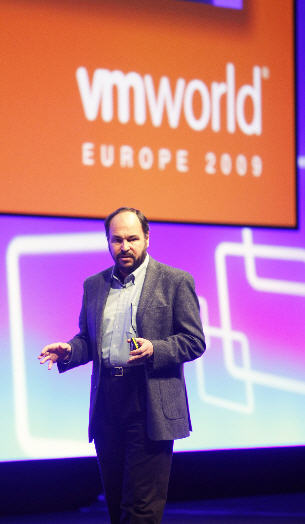VMware demos cloud OS; Touts private cloud computing

VMware on Tuesday outlined a few more components of its cloud computing strategy as the company aims to shift the playing field as rivals like Red Hat, Microsoft and Citrix gun for its core virtualization software.
At VMworld Europe, CEO Paul Maritz elaborated on VMware's cloud computing strategy, which was introduced in 2008 without a lot of detail. This go round, Maritz put a little meat on the concept (statement, Techmeme).

Maritz...
- Demoed VMware's Virtual Datacenter Operating System (VDC-OS), which will ship its first instance in 2009;
- Outlined extensions of the VDC-OS;
- And noted desktop virtualization and other tools to tie it all together.
Private clouds are likely to have their appeal to the enterprise. For starters, a private cloud computing set-up will allow IT shops to deliver service as they would a utility. IT managers would also get more centralized control and be able to better manage computing environments.
VMware's effort is notable because it shifts the virtualization conversation. While the hypervisor heads toward commodity-ville VMware is moving upstream. If the company becomes known for using virtualization to enable clouds and future-proof networks, it won't matter if the hypervisor is built into everything--for free.
VMware outlined some early companies transforming data centers to mini clouds.
If you zoom out a bit you quickly realize that the turf war between VMware, Microsoft, Red Hat and Citrix isn't about virtualization as much as it is the future of the operating system. If you believe--and I do--that the virtualization layer will be the future operating system, then it's not hard to see why Red Hat and especially Microsoft are being fast frenemies with a common target: VMware.
Some links for homework purposes: